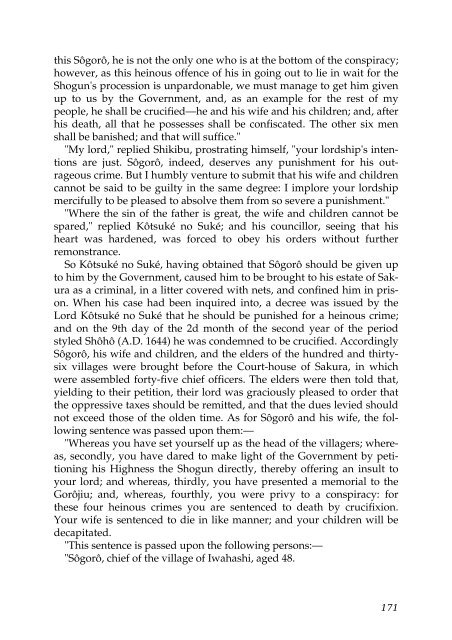Create successful ePaper yourself
Turn your PDF publications into a flip-book with our unique Google optimized e-Paper software.
this Sôgorô, he is not the only one who is at the bottom <strong>of</strong> the conspiracy;<br />
however, as this heinous <strong>of</strong>fence <strong>of</strong> his in going out to lie in wait for the<br />
Shogun's procession is unpardonable, we must manage to get him given<br />
up to us by the Government, and, as an example for the rest <strong>of</strong> my<br />
people, he shall be crucified—he and his wife and his children; and, after<br />
his death, all that he possesses shall be confiscated. The other six men<br />
shall be banished; and that will suffice."<br />
"My lord," replied Shikibu, prostrating himself, "your lordship's intentions<br />
are just. Sôgorô, indeed, deserves any punishment for his outrageous<br />
crime. But I humbly venture to submit that his wife and children<br />
cannot be said to be guilty in the same degree: I implore your lordship<br />
mercifully to be pleased to absolve them from so severe a punishment."<br />
"Where the sin <strong>of</strong> the father is great, the wife and children cannot be<br />
spared," replied Kôtsuké no Suké; and his councillor, seeing that his<br />
heart was hardened, was forced to obey his orders without further<br />
remonstrance.<br />
So Kôtsuké no Suké, having obtained that Sôgorô should be given up<br />
to him by the Government, caused him to be brought to his estate <strong>of</strong> Sakura<br />
as a criminal, in a litter covered with nets, and confined him in prison.<br />
When his case had been inquired into, a decree was issued by the<br />
Lord Kôtsuké no Suké that he should be punished for a heinous crime;<br />
and on the 9th day <strong>of</strong> the 2d month <strong>of</strong> the second year <strong>of</strong> the period<br />
styled Shôhô (A.D. 1644) he was condemned to be crucified. Accordingly<br />
Sôgorô, his wife and children, and the elders <strong>of</strong> the hundred and thirtysix<br />
villages were brought before the Court-house <strong>of</strong> Sakura, in which<br />
were assembled forty-five chief <strong>of</strong>ficers. The elders were then told that,<br />
yielding to their petition, their lord was graciously pleased to order that<br />
the oppressive taxes should be remitted, and that the dues levied should<br />
not exceed those <strong>of</strong> the olden time. As for Sôgorô and his wife, the following<br />
sentence was passed upon them:—<br />
"Whereas you have set yourself up as the head <strong>of</strong> the villagers; whereas,<br />
secondly, you have dared to make light <strong>of</strong> the Government by petitioning<br />
his Highness the Shogun directly, thereby <strong>of</strong>fering an insult to<br />
your lord; and whereas, thirdly, you have presented a memorial to the<br />
Gorôjiu; and, whereas, fourthly, you were privy to a conspiracy: for<br />
these four heinous crimes you are sentenced to death by crucifixion.<br />
<strong>You</strong>r wife is sentenced to die in like manner; and your children will be<br />
decapitated.<br />
"This sentence is passed upon the following persons:—<br />
"Sôgorô, chief <strong>of</strong> the village <strong>of</strong> Iwahashi, aged 48.<br />
171



